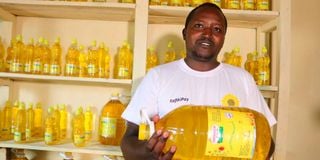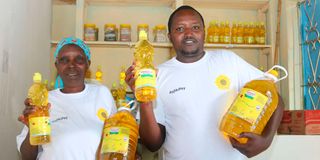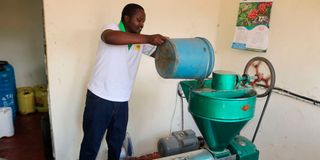Meru farmer Joshua Gitonga extracts cash from lucrative oil seeds

Joshua Gitonga, proprietor Rafikipay Ltd, a Meru County-based cooking oil producing company.
The secret of agriculture is in value addition and processing of farm produce.
If his journey in oil seeds farming can be reversed and he was asked to choose between the paths of selling produce or value adding, Joshua Gitonga, a Meru County-based farmer, insists he would still opt for processing.
He grows sunflower, canola and soya, operating with a range of between 50 to 100 acres.
The farms are distributed across Meru, Tana River and Nakuru counties. “I began with two acres in 2014, growing sunflower and soya,” Gitonga says.
His main market then was animal feed manufacturers.
The market had little returns, Gitonga says, saying he embarked on research that gave birth to the lucrative niche. “I researched and realised I can add value to the sunflower and soya seeds by extracting oil before taking them to the market,” he says.
He began with a two-tonne capacity production machine per day, which he bought at Sh500,000 from own savings.
Later, Mr Gitonga advanced to an eight-tonne processing machine.
Kenya imports over 90 per cent of its cooking oil, with the commodity currently retailing like gold.
Gitonga, 30, says he is unable to meet the huge demand.

Joshua Gitonga and Pauline Mwari, one of his contracted farmers, display refined sunflower oil at his shop in Meru County.
At Chaaria village, about 100 metres from the Meru-Nairobi highway, is Gitonga’s oil seed extraction plant, which sits on half an acre. It comprises two oil processing machines with a capacity of milling 10 tonnes cumulatively per day.
Also in the facility is storage for sunflower, soya and canola seeds and space for assembling oil dispensers.
Gitonga’s venture has grown to an extent he has contracted 62,000 farmers through an aggregation programme where he offers training services on good agricultural practices (GAP).
However, only 25,000 of them are active. Of the 25,000 active farmers, 21,300 are women and youth aged between 18 to 35.
Each farmer, according to the Rafikipay Ltd proprietor, a company he established in 2018 after quitting a Parliamentary Service Commission job to concentrate on oil seed extraction, must have at least a quarter of an acre and attend training.
In addition, a willing member must sign an agreement to comply with services offered, observe GAP and specify the location of his or her farm. They supply him with harvests to fill in the gap of oil demand by his clients.
Pauline Mwari, a sunflower farmer in Meru County, is a beneficiary of Rafikipay Ltd.
Having ventured into oil seed crop farming in the 1970s, Pauline says the facility offers her better pay. “Previously before the plant was opened, a kilo of sunflower produce ranged between Sh2.50 and Sh5 but for now we sell at over Sh50,” she says.
Her main market was sunflower hawkers and brokers who distributed to oil processing companies.
Through good agricultural practices training, Gitonga offers extension services, supplies certified seeds to the contracted farmers, alongside marketing their produce.
Gitonga has adopted the use of modern technology in offering services through Rafiki Farmers Management, a mobile app.
He works with 10 agronomists who disseminate information through the app and also do farm visits.
His contribution in empowering oil seed farmers saw him recognised by Heifer International through the AYuTE Africa Challenge in 2022.
Gitonga was among the first runner ups, taking home Sh500,000 award, saying he injected the funds into his venture.

Joshua Gitonga milling sunflower at his processing plant .
“AYuTE is an initiative that we introduced last year in Kenya, identifying agricultural innovators who are using digital innovations to solve problems facing farmers across all ecosystems,” says Esta Kamau, Heifer country director.
Gitonga rotates oil seed cakes with maize and wheat, ensuring he grows sunflower on at least 20 acres every season since it is his main crop.
A litre of purified sunflower oil goes for Sh300, canola costs Sh350 while soya costs Sh400, wholesale price.
Gitonga says 95 per cent of the oil is sold to distributors. He gives his distributors free oil ATMs for dispensing the oil, adding that his products are natural, with no additives.
Nothing goes to waste at his facility. The husks are given to livestock, while other residues such as seed cake are converted to affordable animal feed. He has partnered with cooperatives for animal feed processing, where he supplies them with the byproducts.
Gitonga has 12 permanent workers, and when work overwhelms them, he contracts 10 casual workers especially during planting, weeding, harvesting and when mass processing is needed.
However, it has not been a walk in the park as he cites access to certified seeds being one of the major setbacks. He depends on seeds sourced from Tanzania, Malaysia and Ukraine through licensed importers, which are very expensive.
Lack of sophisticated machines and funds to expand the processing facility, so as to meet the increasing cooking oil demand, also hinders his growth.
Gitonga is currently finalising certification of his products, through the Kenya Bureau of Standards (Kebs).
“Value addition is the way to go, especially to address dependency on importation of foodstuff. Farmers and actors should figure out how to embrace and explore the many opportunities within processing.”





